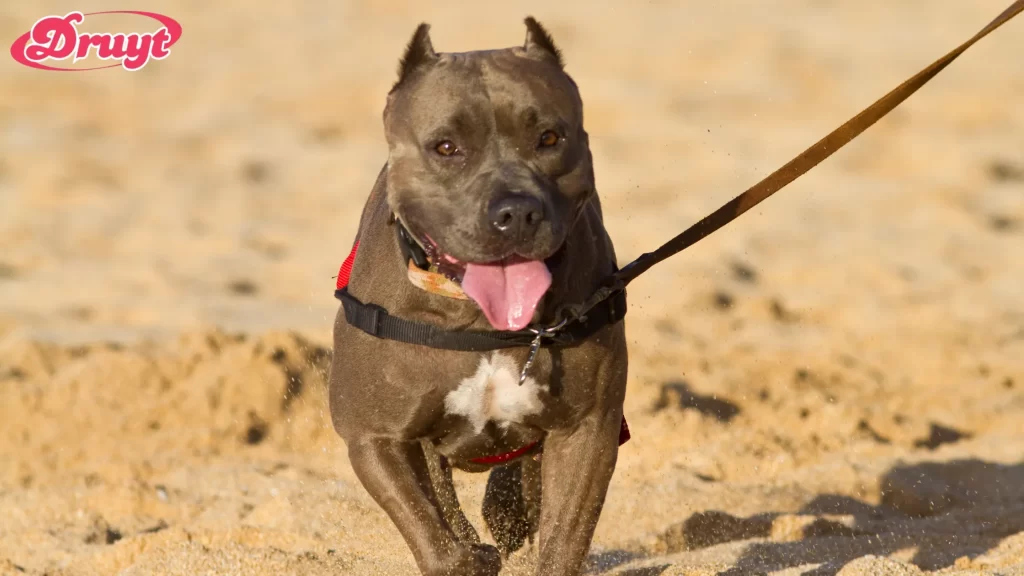Table of Contents
When you welcome a Pit Bull into your family, you’ll want to know everything about them, especially how long do Pit Bulls live. Their lifespan is a significant concern for any pet owner, as it helps you understand how to care for them through every stage of life. In this expanded guide, we will explore their average lifespan, key factors that affect it, and vital tips to ensure they live long, healthy lives. Let’s dive into the vital facts that every Pit Bull owner should know to keep their pet happy and strong.
How Long Do Pit Bulls Live on Average?

The typical lifespan of a Pit Bull is between 12 to 15 years. However, this can vary depending on several factors, including their genetics, lifestyle, and the care they receive throughout their life. While some Pit Bulls may live longer than 15 years, others may face health challenges that shorten their life expectancy. This breed is known for its strength, loyalty, and energy, and with the proper care, it can be a loving companion for many years.
If you’re wondering how long do Pit Bulls live, it’s important to note that providing them with the right environment, nutrition, and healthcare can significantly impact their lifespan.
Also Read: How Long Does Neutering Take? Discover the Amazing Benefits!
Factors Influencing How Long Pit Bulls Live

Several elements affect how long Pit Bulls live. While some are out of your control, many factors can be managed through diligent care. Understanding these aspects can help you create the best possible life for your Pit Bull:
- Genetics: Genetics plays a huge role in determining the lifespan of your Pit Bull. Dogs from healthy bloodlines with minimal health issues often live longer. Reputable breeders focus on eliminating hereditary conditions, which can improve longevity.
- Diet: A well-balanced diet packed with the right nutrients is crucial for keeping your Pit Bull healthy. Dogs that are fed high-quality food tend to live longer, as proper nutrition supports their immune system, muscles, and organs.
- Exercise: Pit Bulls are naturally athletic dogs. To maintain their health and fitness, they need to be physically active on a daily basis. Daily walks, runs, and playtime help prevent obesity and other health issues that can shorten their lifespan.
- Healthcare: Routine veterinary care is essential to maintaining your Pit Bull’s health. Vaccinations, dental care, and regular check-ups are all key to catching potential health problems early and preventing future issues.
- Spaying and Neutering: Spaying or neutering your pit bull can improve its health by preventing certain types of cancers and infections, which can directly affect how long it lives.
By managing these factors, you can extend your Pit Bull’s lifespan and ensure they remain happy and healthy throughout their life.
Also Read: Can you power wash plastic pee pad holder? Expert Answers
Common Health Issues Affecting Pit Bulls

Despite being strong and resilient dogs, Pit Bulls are prone to certain health issues that can impact their lifespan. Knowing the common ailments that affect this breed is crucial for early detection and treatment. Here are some health concerns that might affect how long Pit Bulls live:
- Hip Dysplasia: This condition occurs when the hip joint doesn’t form properly, leading to arthritis and pain over time. While it is partly genetic, maintaining a healthy weight and providing joint supplements can help reduce the risk.
- Skin Allergies: Pit Bulls are prone to skin allergies, which can lead to irritation and infections. Identifying the cause of allergies, whether it’s food or environmental factors, can help you manage this issue effectively.
- Heart Disease: Some Pit Bulls may develop heart conditions, which can shorten their lifespan if left untreated. Regular check-ups and heart-healthy foods can help mitigate these risks.
- Thyroid Problems: Hypothyroidism is a common issue in Pit Bulls, leading to weight gain, lethargy, and other health concerns. Proper medication can manage this condition and extend your dog’s lifespan.
- Obesity: Pit Bulls can gain weight quickly if not exercised regularly. Numerous health concerns, including diabetes, heart disease, and joint troubles, can be brought on by obesity. Maintaining a healthy diet and exercise routine is key to preventing obesity.
- Cancer: Like many dog breeds, Pit Bulls are susceptible to cancer, particularly as they age. Regular vet check-ups can help catch cancer early, giving your dog a better chance of survival.
By being aware of these health issues and working with your vet to manage them, you can help ensure your Pit Bull lives a long, healthy life.
How to Improve and Extend Your Pit Bull’s Lifespan
Now that we’ve discussed some of the factors that affect how long pit bulls live, let’s look at ways to improve your dog’s life expectancy actively. Here are practical tips you can implement to help your Pit Bull live longer and stay healthy:
- Provide a Nutritious Diet: Feed your Pit Bull high-quality dog food that’s rich in proteins, fats, and vitamins. Look for brands that use real meat as the primary ingredient, and avoid fillers and by-products that offer little nutritional value. A balanced diet strengthens their immune system and keeps them energetic.
- Ensure Plenty of Exercise: Pit Bulls are active dogs that thrive on physical activity. Incorporating regular walks, runs, and play sessions into their routine will help keep them physically fit and mentally stimulated. Exercise also prevents obesity, a major risk factor for many health problems.
- Mental Stimulation: In addition to physical exercise, mental stimulation is essential for keeping your Pit Bull happy and engaged. Puzzle toys, training exercises, and interactive play are great ways to keep their mind sharp, reducing stress and behavioral issues.
- Regular Veterinary Check-ups: Routine vet visits are crucial for catching potential health problems before they become serious. A vet can help you manage your dog’s diet, monitor their weight, and recommend preventive care, such as vaccinations and parasite control.
- Keep Your Dog at a Healthy Weight: Maintaining an optimal weight is one of the easiest ways to extend how long Pit Bulls live. Obesity leads to numerous health problems, including joint issues, heart disease, and diabetes. Consult with your vet about the appropriate portions for your dog’s size and activity level.
- Grooming and Hygiene: Regular grooming not only keeps your dog clean but also allows you to check for any abnormalities, such as lumps, skin irritations, or ear infections. Keeping up with regular baths, nail trims, and ear cleanings can prevent diseases and other health issues.
- Spay or Neuter Your Pit Bull: Spaying or neutering your pit bull not only prevents unwanted litter but also lowers the risk of cancers and other reproductive health issues, helping to improve how long pit bulls live.
By following these tips, you’ll be giving your Pit Bull the best chance at a long and happy life. These steps, along with proper healthcare and a loving environment, can significantly extend your dog’s lifespan.
Also Read: How Long Do Pit Bulls Live? Vital Facts
How Aging Affects Pit Bulls and How to Adjust Their Care
As your Pit Bull ages, their needs will change. To ensure how long Pit Bulls live reaches their full potential, it’s important to adjust your care routine as they grow older. Here’s what you should expect as your Pit Bull enters their senior years:
- Reduced Activity: Older Pit Bulls may not be as energetic as they once were. While they still need exercise, it’s important to provide low-impact activities, such as short walks or gentle play, to prevent joint strain.
- Joint Pain: Arthritis and other joint issues are common in senior dogs. Joint supplements, medications, and comfortable bedding can help alleviate their discomfort.
- Dietary Adjustments: Senior Pit Bulls may need different nutrients compared to their younger counterparts. Please speak with your vet about adjusting their diet to ensure they’re getting the right amount of calories, fiber, and protein for their age.
- More Frequent Vet Visits: As your Pit Bull ages, they may require more frequent veterinary check-ups to monitor their health and catch any potential issues early.
- Changes in Behavior: Older Pit Bulls may experience changes in behavior, such as increased anxiety or more frequent napping. Keep an eye on these changes and discuss them with your vet to rule out any underlying health problems.
By staying attentive to your pit bull’s changing needs as they age, you can help maximize how long pit bulls live, giving your dog the best quality of life in their golden years.



